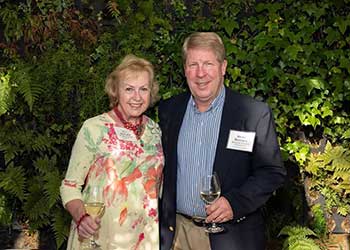Doschers share the gift of hope
By John Nash
 Tina Doscher woke up from surgery in 2010 to find a red call button on her chest, placed there in case she needed a nurse.
Tina Doscher woke up from surgery in 2010 to find a red call button on her chest, placed there in case she needed a nurse.
When she went to reach for it, she realized she couldn’t move her hands, arms or legs. The only thing that seemed to work was her mouth.
“All I could do was holler, ‘Help me,’” she remembers.
Doscher had just undergone a procedure to treat an arteriovenous malformation (AVM), a dangerous tangle of blood vessels around her upper spinal cord that had caused a gradual decline in her balance and physical function.
Her surgeons in Phoenix removed the malformation in a two-part procedure. The operation went well in all respects – but one.
“They said, ‘Everything looks good. You’re perfectly healthy,” she said. “’We just can’t figure out why you can’t move.’”
For two days, Doscher sat in bed completely immobilized. “I was never ‘woe is me,’” she said. “But I did have times when I wondered: Is this the rest of my life?”
Finally, on day three, a flash of hope. She woke up to see her husband, Ricky, standing by her hospital bed. “He said, ‘You just lifted up your head off of the pillow.’ That’s all I needed to hear. I said, ‘I will get it back. I will get it ALL back.’”
After six weeks in Phoenix, Doscher returned home to Charleston and began physical rehabilitation. As part of her treatment, she participated in studies at the MUSC College of Health Professions that provided her with access to cutting-edge therapies not yet widely available, including transcranial magnetic stimulation, which she says rid her of tremors.
It was difficult, sometimes painful work. But slowly, she began to regain the use of her limbs.
Today, her wheelchair is gone. She walks, drives, serves on volunteer boards and travels extensively. She watches old videotapes of herself during her early days of rehab and is amazed by how far she has come.
She says her recovery would not have been possible without the care and guidance of her rehab team at MUSC – and of course, the spark of hope that came to her on day three and grew stronger with each day.
Now, she wants to share that hope with others facing the same journey.
“That’s my driving force,” she said. “Half of these people in wheelchairs give up. I don’t want them to give up. That’s what I want more than anything.”
In December, Tina and Ricky Doscher put that vision into motion with a $10 million gift to the College of Health Professions – the largest in the college’s history.
The Doschers discovered they could make the biggest impact with a two-part gift: An outright gift that provides the college with immediate funding for current priorities and a planned gift made through their estate that will provide the college with a permanent source of funding for future initiatives.
Together, these gifts support all three aspects of the college’s mission: research, education and patient care.
On the research front, it will fuel the college’s efforts to develop new and better ways to help people regain function after neurological diseases.
In education, it will provide the college’s dean with a permanent source of funding to pursue emerging opportunities and priorities.
Finally, it will support the MUSC Neurological Exercise and Training (NExT) Wellness Research Center, a place where people with neurological conditions can participate in regular exercise, find mental and emotional health resources and build community with others sharing similar experiences.
“What the Doschers have done here is truly transformational,” said Dean Zoher Kapasi, Ph.D., PT. “Our college has always been a place built on big ideas. This gift will empower us to put those ideas into action for the benefit of future generations. What a powerful legacy.”
In recognition of the Doschers’ generosity, the college will name the lobby of its fourth and newest building, scheduled to open in 2025, in their honor.
Doscher says she never considered it important to have her name in a building. But then she reconsidered.
“God puts you where He wants you, and here I am,” she said. “I have a perspective for the other side, and I have a voice. There are people out there we can help and if I can encourage them in some way, then I want to do that.”



